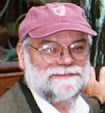Nobody knows how many people have died in the past 8 days in Haiti. We know neither how many or even the names of all the dead. Estimates vary widely, the latest I heard being from 100,000 to 200,000. I even heard that it's possible that more Americans have died in the Haiti earthquake than in the 9-11 attacks in America. Every night we see on television the unburied bodies in the streets of Port-au-Prince and the mass graves, where countless unidentified bodies are being buried.
My first thought is that we must try to help--to bring food, water, healthcare, and shelter to the living; and to bury the dead. And when this part of the emergency is over, we must help rebuild a better-functioning Haiti. These are our neighbors, our brothers and our sisters. I think every single American should help, even if it means contributing only a dollar. Some of us who are able should contribute much, much more. I heard this morning that Sandra Bullock has contributed a million dollars. And Lebron James has given $100,000.
My second thought travels across the Atlantic Ocean to the Irish town of Sligo, where I attended the William Butler Yeats Conference a few years back .
Just outside Sligo town is a cemetery for the dead of An Gorta Mor, the Great Hunger, the Irish Famine of the late 1840's. No one knows exactly how many died or were forced to emigrate from Ireland (to America, England, Australia, and elsewhere) because of the famine. It is thought that perhaps a million people died in the Irish famine, with maybe another million fleeing the country. My ancestors survived the famine, barely, and left Ireland for America in the 1850's. This same story holds true for probably 25% of Greater Clevelanders. Anyway, right outside Sligo there is the resting place of those who died of hunger or hunger-related disease. They were buried in mass graves--and their names are not known.
Disaster is part of the DNA of all humans. I know that the Irish don't forget how close we are to disaster. This is why we must feed the hungry, give drink to the thirsty, shelter the homeless, comfort those in sorrow, bury the dead. We are called on to perform the Works of Mercy, a lesson I first learned at St. William's School in Euclid and then at St. Joseph High School in Cleveland.
Wednesday, January 20, 2010
Mass Graves In Haiti and in Ireland
Subscribe to:
Post Comments (Atom)


No comments:
Post a Comment